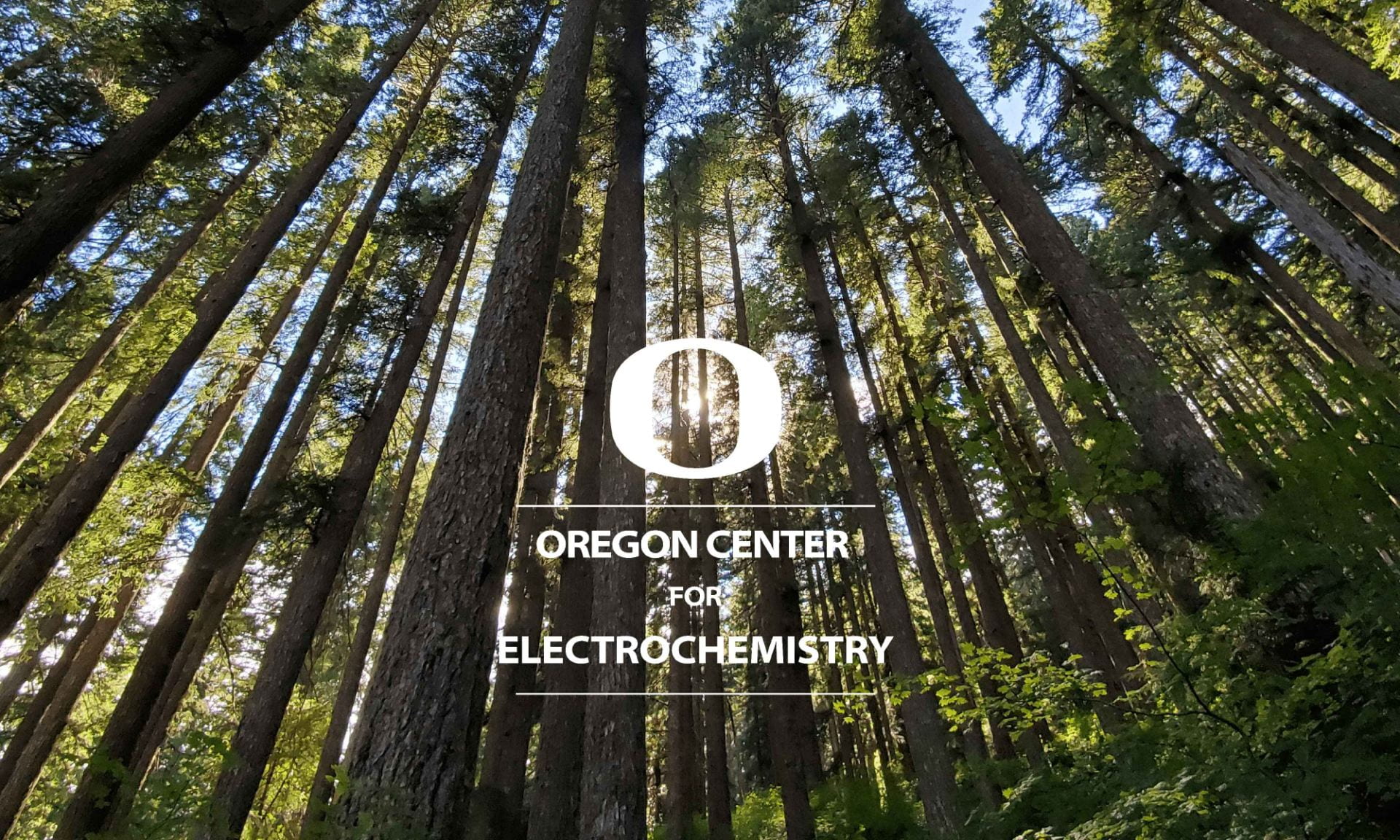Online resources to prepare for Electrochemistry MS program are listed below. These resources are all free. We have screened them to find those that appear most relevant and useful in preparing for the Electrochemical Technology coursework and internship. You will find the electrochemical technology program smoother if you review/earn some of the material below first!
Learn Python for Data Analysis from freeCodeCamp:
https://www.freecodecamp.org/learn/data-analysis-with-python/
We use Python extensively in the OCE MS program. Please start getting fluent with basic Python data analysis and graphing.
Review or learn electrochemical concepts from General Chemistry – these are excellent videos: https://www.youtube.com/watch?v=teTkvUtW4SA&list=PL3hPm0ZdYhyzTLPg-D7oo3jk3Sp2eP9I2
If you are ready for more, start watching the lectures from our graduate course:
https://electrochemistry.uoregon.edu/education/
Lecture recordings from graduate electrochemistry previously offered at UO. This material will be covered in the first quarter of the Electrochemical Technology program (as well as much more). Students can start this work after reviewing the below material to identify knowledge gaps from undergraduate coursework.
Review general chemistry. Talented and intelligent students forget key concepts by the time they start graduate school.
Here are the relevant video lectures from courses we have taught. These are all important concepts in electrochemistry.
Bonding 1 – ionic bonding and lattice energy
Hydrogen Bonding, Polarizability, and Dispersion Forces
Surface Tension and Properties of Liquids
Solutions – Solubility and Saturation
Solutions – Molarity and Molality
Kinetics 1 : Chemical Kinetics and Rates of Reactions
Kinetics 2: Rate Laws and Reaction Orders
Kinetics 3: Solving for Reaction Orders and Rate Constants
Kinetics 4: Integrated Rate Laws
Kinetics 5: Collison Theory and Activation Energy
Kinetics 6: Reaction Mechanisms
Kinetics 7: Reaction Mechanisms and Catalysis
This Microbachelors in chemistry with a focus on energy and electrochemistry is also highly relevant:
https://pll.harvard.edu/course/microbachelors-program-university-chemistry?delta=0
Physics Review
Watch, study, and understand basic electrostatics: Review Lecture: Electrostatics, charge, fields and potentials
Understanding core concepts of electric potential, current flow, circuits, from undergraduate level electrostatics is essential to understand electrochemistry.
https://courses.edx.org/courses/course-v1:RiceX+PHYS102.1x+3T2017/course/ Introductory electricity and magnetism (e.g. from calculus based introductory physics). This is a good review of charge, electric fields, potentials, Gauss’s law, and basic circuits.
https://www.edx.org/course/electricity-and-magnetism-electrostatics Introduction to electrostatics and circuits from MIT.
Python Programming – take a look at one of these courses
This is an excellent introduction to Python for Science and Engineering and data analysis developed by João Quinta da Fonseca for a 1st Year Materials Science Course at Manchester.
https://github.com/JQFonseca/computing_materials_science
freeCodeCamp has a comprehensive video course including introductions to Jupyter Notebooks, Numpy, and Pandas–all of which are used throughout our program.
https://www.freecodecamp.org/learn/data-analysis-with-python/
Taylor Sparks at U. Utah has posted great introductory course videos for Python in Materials Science: https://www.youtube.com/playlist?list=PLL0SWcFqypCmkHClksnGlab3wglEVMqNN
Here is a Harvard-based course introducing Python concepts for researchers including data manipulation, plotting, and analysis:
https://www.edx.org/course/using-python-for-research
Engineering
https://www.edx.org/course/the-basics-of-transport-phenomena Delft University Engineering Course on Transport. The transport of mass (ions, solvent, electrons, etc.) form one of the pillars of electrochemistry. The first few lectures on mass and energy balance are particularly useful. Transport is not taught substantially to scientists, relative to engineers.
Physical Chemistry
Undergraduate physical chemistry course covering basic thermodynamics. Very useful if you have not taken chemical thermodynamics in your undergraduate degree program: https://ocw.mit.edu/courses/5-60-thermodynamics-kinetics-spring-2008/
Additional interesting material
https://www.edx.org/course/structure-of-materials – useful introduction to solid-state materials including defects from MIT – for understanding battery materials (anode/cathode) and polymer components of electrochemical systems.
https://courses.edx.org/dashboard/programs/452d5bbb-00a4-4cc9-99d7-d7dd43c2bece/ Micromasters degree program in Principles of Manufacturing. The content in the manufacturing process control courses are highly relevant to industry. The content will be live in August and freely available for auditing.
https://www.edx.org/course/electric-cars-technology Primer on electric cars from Delft University, some engineering concepts included.
https://courses.edx.org/courses/course-v1:MEPhIx+MEPHI006x+3T2018/course/ Methods of Surface Analysis. Surface science methods are used extensively in materials chemistry and often used in conjunction with electrochemical methods. CAMCOR at the University of Oregon offers access to all the tools discussed in this short course.
Advances, Challenges, and Long-Term Opportunities of Electrochemistry: Addressing Societal Needs. A Chemical Sciences Roundtable Workshop This 1-day workshop summarizes current research and development trends in electrochemical science and engineering from an academic perspective.
